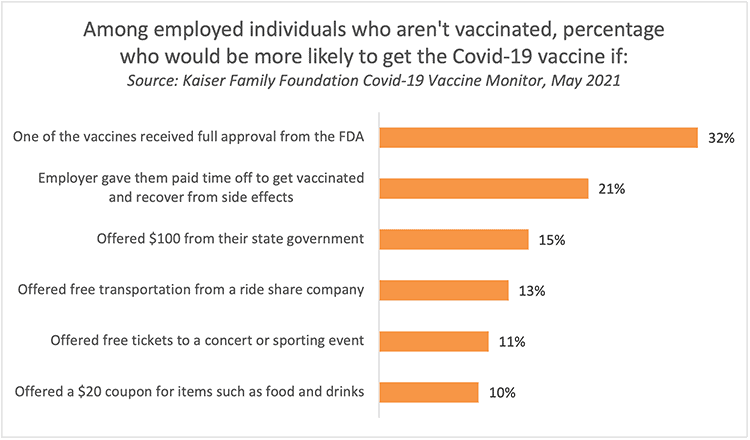
Banking’s Vaccine Dilemma
David Findlay has witnessed several crises over his 37-year banking career, but he says the Covid-19 pandemic has been the most challenging – one that continues to redefine what it means to be a good employer.
“We took a very protective stance of our entire workforce,” says Findlay, the CEO of $6 billion Lakeland Financial Corp., based in Warsaw, Indiana. Lakeland’s subsidiary, Lake City Bank, has followed Centers for Disease Control and Prevention and health department guidance to sanitize branches, and closed lobbies as needed. Around one-third of employees worked remotely.
These early decisions were easy, Findlay adds. Encouraging employees to get vaccinated against Covid-19 has resulted in a new dilemma, due to “divisions between those [who] believe in the efficacy of the vaccine,” he says, “and those [who] don’t.”
Righting the economic ship has long hinged on successfully defeating the coronavirus through the development and broad adoption of one or – as came to pass – multiple vaccines. “Ultimately, the economic recovery depends on success in getting the pandemic under control, and vaccinations are critical to our ability to accomplish that,” Treasury Secretary Janet Yellen told the Senate Banking Committee in March.
Like all businesses, vaccinations allow banks to safely reopen branches and repatriate staff into offices. All three of the Covid-19 vaccines available in the U.S. are currently authorized for emergency use by the Federal Drug Administration; some Americans say they won’t get vaccinated until they receive full approval by the FDA.
In early May, Lakeland rolled out an organization-wide vaccination program, updating employees about Covid-19 cases, quarantines and vaccination efforts for the organization. Employees have had access to an on-site vaccination clinic, and the bank pays a $100 bonus to each vaccinated employee, with another $100 to the nonprofit of their choice.
The program was retroactive, so the roughly 40% of employees who were already fully vaccinated were rewarded, too. As of June 10, half of the bank’s employees reported that they had been vaccinated, which compares favorably to Indiana’s population, at 39%, and 30% for Lakeland’s home base in Kosciusko County.
“We have made it clear that this is a personal choice and that we must all respect each other, regardless of [our] position on the vaccine,” says Findlay. “It has been a challenging 17 months, and we must all stick together so our culture can survive the pandemic.”
Carrots, not sticks, also drive the vaccination program at Pinnacle Financial Partners. “This is a personal decision, it’s a medical decision, so we don’t want to cross that line,” says Sarae Janes Lewis, director of associate and client experience at the $35 billion bank.
Pinnacle started communicating the benefits of the vaccine in December 2020 – around the time that the FDA first approved emergency use for the Pfizer and Moderna vaccines. It started its incentive program in March, after the vaccine became more broadly available. Employees get time off to get vaccinated – a half day per shot – and receive a $250 gift card to spend as they like. “We wanted to make the amount enough to incentivize people,” says Lewis, “but we didn’t want it to be so much that it felt like someone who had not made that decision yet would feel overly pressured.” Pinnacle includes a thank-you note with each gift card.
And they’re promoting the upsides of getting vaccinated. Vaccinated employees aren’t required to wear a mask, for example; those who haven’t yet gotten the vaccine are asked to mask up. Pinnacle isn’t policing its employees’ mask use.
When Lewis and I spoke, 64% of Pinnacle’s associates reported to the bank that they were fully vaccinated against Covid-19. That’s well ahead of the bank’s hometown of Nashville, at 44%, and home state of Tennessee, where roughly one-third of eligible individuals are fully vaccinated. An employee survey revealed that many of Pinnacle’s employees who are hesitant may reconsider once one or more of the vaccines receive full FDA approval. When that happens, Lewis says that the bank may ramp up communications again, and incentives will remain in place.
This high vaccination rate – and understanding the vaccination status of its employees – has helped Pinnacle reopen locations and get a little closer to normal operations. “If there does happen to be an exposure, we’re not having to close offices anymore,” Lewis says. “It’s been pretty amazing to have that stability.”
Lake City and Pinnacle both boast above-average vaccination rates compared to their communities, but they’re still below President Joe Biden’s goal for 70% of American adults to be partially or fully vaccinated by the Fourth of July. So, should banks help close this gap by requiring that employees get vaccinated?
Companies can do that, according to guidance from the Equal Employment Opportunity Commission that was updated in late May.
Adam Maier, a partner at the law firm Stinson LLP, believes banks like Pinnacle and Lake City, that focus on education and modest incentives, have the right approach. The EEOC guidance is “fraught with uncertainties,” he adds. “It’s such a tightrope to be walking to mandate vaccines and also make sure you’re not doing it on a discriminatory basis, or with a discriminatory outcome.” Companies still must comply with the Americans with Disabilities Act and Title VII of the Civil Rights Act, which prohibits discrimination based on race, color, religion, gender, pregnancy or national origin. Incentives also can’t be coercive.
Both Lake City and Pinnacle emphasize their respect for employee choice, and that appears to be a consistent theme for the industry. Bank of America Corp. CEO Brian Moynihan was asked in the company’s April shareholder call if the board would “commit to not coercing our employees into getting the COVID vaccine.” Moynihan responded that the bank emphasized communication and education – and the right for each employee to come to their own decision.
The megabank asks employees to update their vaccination status through an online portal. Requesting an employee’s vaccine status – confidentially – is clearly permitted by the guidance, Maier confirms.
“Whatever your approach is, just try to be respectful,” advises Maier. “Be reasonable and rational, and don’t get caught up in any individual employee’s decision.”




